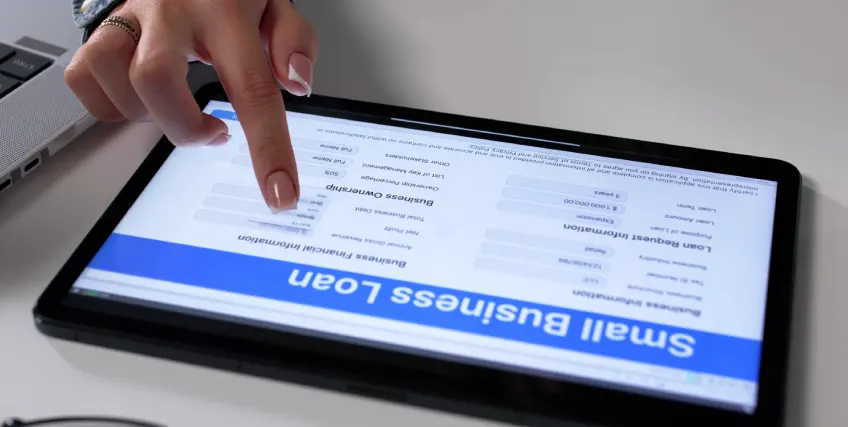Pros and Cons of Using Short-Term Lenders for Your Business
April 08, 2025 | Last Updated on: April 08, 2025

For many small business owners, access to capital is more than a luxury, it's a necessity. Whether it's managing operational costs, covering unexpected expenses, or seizing a limited-time business opportunity, financial agility can make all the difference. In moments when time is of the essence, traditional long-term loans may not offer the speed or flexibility needed. That’s where short-term lenders step in.
Various online short-term lenders for entrepreneurs promise fast funding with minimal documentation, but are they worth the higher interest rates and shorter repayment periods? Let’s see.
In this article, we’ll cover who short-term lenders are and why small business owners often prefer them, common types of short-term loan options, and the pros and cons of using online short-term loan lenders for your business.
Who Are Short-Term Lenders, and Why Do Small Business Owners Use Them?
A short-term lender is typically a non-bank financial institution, credit union, or online platform that offers funding with shorter loan terms, usually between a few weeks to 18 months. Unlike banks, these lenders tend to focus more on your business's cash flow, checking account activity, and revenue, rather than just your credit score or credit history.
According to the Credit Survey, nearly 40% of small businesses applied for financing to cover operational costs. A growing number turned to online or alternative lenders for same day approval and faster disbursement.
Why Small Business Owners Choose Short-Term Lenders
Small business owners often choose short-term lenders because of:
- Speedy loan application and approval processes.
- Less stringent eligibility requirements (even with bad credit).
- Funding that arrives as soon as the next paycheck or within one business day.
- No collateral is needed in many cases.
Let’s say a retail store experiences a sudden inventory shortage before a big sales event. Here, waiting weeks for a traditional lender to process the loan application would mean missed revenue. However, an online short-term loan from lenders could easily provide necessary funds by the next business day.
Types of Short-Term Loan Options
There are various types of loan options offered by short-term lenders for entrepreneurs. These loan products are designed for specific business needs. Here are some of the main types of short-term loans:
Short-Term Business Loans
These loans offer a lump sum loan amount upfront that typically comes with a fixed rate of interest. Also, the repayment schedule of these types of loans might involve weekly or monthly payments over a short period of time.
Merchant Cash Advance (MCA)
MCAs are a type of financing solution and not a loan, offered by short-term lenders. Here the repayment is made through a percentage of daily credit card or debit card sales. However, MCAs don’t require a strong credit history or any traditional collateral.
Business Lines of Credit
Business lines of credit function similar to a credit card. Here business owners can borrow immediate funds up to a predetermined limit, paying the interest only on the borrowed amount. These loan options are perfect for managing unpredictable cash flow in the businesses.
Invoice Financing
Invoice financing allows businesses to borrow funds against unpaid invoices. This is one of the excellent ways to convert receivables into usable capital for businesses.
Equipment Financing
Equipment financing is a type of loan option where businesses can purchase equipment without paying upfront money. In this case, the equipment itself serves as collateral.
Installment Loans and Short-Term Personal Loans
Installment loans or short-term personal loans are typically used by individuals. These loan products are perfect for sole proprietors and freelancers. Additionally, these loan products can easily be repaid in fixed monthly payments.
Payday Loans and Title Loans
Payday loans and title loans are high-risk, short-term loan options. A payday loan is typically repaid by the next check, whereas title loans are secured by a car title. However, both loan options come with high interest rates and steep late fees.
Pros and Cons of Using Short-Term Lenders for Business
Here’s the main section every business owner should pay close attention to. While short-term loans offer fast access to capital, they come with trade-offs that can affect your cash flow, business credit, and long-term sustainability.
Pros
1. Timely Approval
Short-term lenders excel in speed. Some of the top short-term loan companies provide same day loan approval, offering funds in your bank account within days. This is one of the best advantages when faced with urgent repairs or unexpected expenses.
2. Easy Application Process
The application process for short-term loans is straightforward. This is often fully digital and takes less than 10 minutes to fill. Also, many short-term lenders only require recent bank statements, a checking account, and proof of business activity.
3. Flexible Eligibility
Business owners having bad credit or limited credit history can also have access to funds. Many short-term lenders do a soft credit check and focus more on revenue rather than credit score.
4. Minimal Documentation
Unlike long-term loans that require tax returns, business plans, and personal financial statements, short-term loans need fewer disclosures and come with less paperwork.
5. No Collateral in Many Cases
Some short-term loans such as unsecured loans don’t require any sort of collateral. This in return reduces the risk of losing property if you default.
6. Can Improve Credit Score
Timely loan payments on installments loans or business lines of credit if reported to credit bureaus can also help in improving your business credit profile.
7. Multiple Loan Options
There are multiple loan products to opt for. From merchant cash advances to installment loans to business lines of credit, short-term lenders offer a wide menu of financial tools.
Cons
1. High Interest Rates and Fees
This is one of the biggest drawbacks of choosing short-term lenders. Annual percentage rates (APRs) can exceed 60%, especially for payday loans or merchant cash advances. It’s better to read the fine print to understand the true cost.
2. Small Loan Amounts
Short-term lenders typically offer smaller loan amounts. In case if you’re seeking funds for expansion or new product development, the loan amount may fall short.
3. Frequent and Rigid Repayment Terms
Short-term lenders often offer short and rigid repayment terms. Some loan options require weekly or monthly deductions, that can strain cash flow if revenue dips.
4. Higher Default Risk
The short repayment term and high cost can often lead to missed payments. This leads to late payment penalties and higher future borrowing costs.
5. May Require Personal Guarantees
Short-term loans, including unsecured loans, typically come with a personal guarantee. These put your personal finances at risk.
6. Limited Regulatory Oversight
It’s important to pay attention that not all short-term lenders are FDIC (Federal Deposit Insurance Corporation) insured. Always verify the lender’s credentials and check online reviews on third-party platforms.
7. Potential for Debt Spiral
Some businesses rely on one short-term loan to repay another. This often leads to a dangerous cycle. This is especially common when choosing short-term loans with higher interest rates or shorter repayment periods.
8. Lack of Transparency
Many short-term loan lenders don’t clearly disclose origination fees, repayment schedules, or how late fees accumulate. It is important to ensure that all disclosures are made up front before signing any sort of loan agreement.
9. Not Ideal for Debt Consolidation
When compared to long-term loan products that come with lower interest rates, short-term loans are not suitable for consolidating high-interest debt. This is because of their short lifespan and cost structure.
Final Thoughts
Short-term lenders offer fast, flexible, and relatively easy access to capital when your business needs it most. But the trade-offs, including high interest rates, shorter repayment terms, and potential risks to credit and cash flow should not be ignored.
Before taking on a short-term loan, review your eligibility, consider your ability to meet the repayment schedule, and compare multiple lenders. Always check if the lender is registered with NMLS, affiliated with a credit union, or listed under FDIC-regulated financial institutions. Be sure your application process includes clear disclosures and doesn’t trap you in a cycle of costly short-term borrowing.
FAQs About Short-Term Lenders
Who are short-term loan lenders?
Short-term loan lenders—such as fintechs and alternative lenders—offer fast-access loans with repayment periods typically ranging from a few weeks to 18 months. Unlike traditional banks, they prioritize cash flow over credit history, making them a popular choice for small businesses needing quick capital.
Are short-term loan lenders safe to rely on?
Various short-term lenders are legitimate and safe to rely on, it’s important to verify their credentials. You can look for lenders who are registered with the NLMS (Nationwide Multistate Licensing System) or affiliated with regulatory bodies like the FDIC. Make sure to read disclosures carefully, check online reviews, and ensure transparent terms before signing any type of loan agreement.
Do short-term loan lenders check your credit?
Some short-term loan lenders typically perform a soft credit check, while others may skip the credit check. Nevertheless, many lenders evaluate business performance, checking account activity, and daily sales instead of relying solely on the credit score.
What types of short-term loans do these lenders offer?
Short-term loan lenders offer various types of loan options. These include merchant cash advances, invoice financing, business lines of credit, installment loans, equipment loans, payday loans, and short-term personal loans for business purposes.
Are there any hidden fees with short-term loan lenders?
Some short-term lenders might charge origination fees, late fees, or prepayment penalties. However, not all lenders are upfront about these charges. Therefore, it is always better to review the loan agreement carefully and confirm all disclosures before making any kind of commitment.




